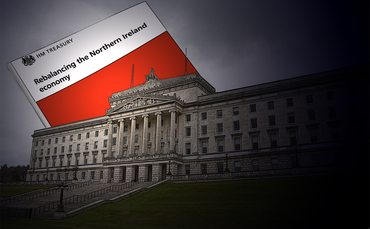Tax rate deal is finely poised
Ministers now have a difficult decision to make. The deal to allow Northern Ireland to offer business, new and old, a corporation tax rate of 12.5% is finely poised. Should the Treasury deal be accepted?
There is little doubt that a sharp drop in the corporation tax rate would make Northern Ireland more attractive to business investors and, over time, increase investment and jobs in the private sector.
The deal, under the State Aid rules applicable across the EU, means that the reduced corporation tax revenue would transfer as a deduction from the funds available to the Executive budget. The negotiations with the UK Treasury are on the basis that the Executive would manage the reduced local budget in return for the benefits of the extra incentive to attract increased investment.
The trade-off is that the increase in investment and an extra 50,000 jobs over a 20-year period would be sufficiently attractive to offset a tighter local budget. However, the evidence suggests that the Treasury calculations on the cost of the deal are more painful than Northern Ireland ministers expected.
Additionally, there is a question of timing. The reduced tax revenue, through the Block Grant, would impact (whatever the phasing of the change) in advance of the expected full business stimulus: the pain would come before any of the gain.
Interim reports on the outline of the deal proposed by the Treasury suggest that the Executive has been disappointed in at least three ways.
The Treasury calculates (on an already reduced estimate from the original) that the impact on the Block Grant could be more than £360m each year, based on half of 1.5% of the UK total: not the original estimate of £200m as calculated in Northern Ireland which envisages an escalator clause which increases the annual deduction each year at twice the rate of any UK increase, as the incentive attracts extra businesses and adds a further cost on the NI Block Grant to pay for the administration of the newly devolved system.
An expectation that the Treasury would build-in an offset to the reductions in the Block Grant based on the extra tax revenues stemming from increased income tax and VAT does not seem to have been persuasive.
The Treasury are also very aware that this tax-varying deal is being watched closely in Scotland.
With an offer of an expensive deal, Executive ministers have a painful choice where they must balance political, social and economic issues.
Should they accept the deal as now formulated?
That choice should only be made with clear answers to two related questions. First, if the deal was accepted, where would the Executive make offsetting cuts in the public sector budget?
Second, if the deal is rejected, how might the economic strategy be enhanced to make up for its loss with alternative policies?
Both of these questions pose major difficulties and associated political tensions.
Planning for budget revenue reductions of up to £400m each year, even if not an immediate necessity, would be conspicuous.
Ministers would be expected to reconsider how we finance water services, the extent to which Housing Executive finances can be tightened, or how to radically reorganise the scale of educational provision. Presumably, the already strapped health service would be (at best) left alone.
The alternative need to devise an amended economic strategy is not an easy option.
The equivalent for business profitability, in financial terms only, might be achieved if the productivity of businesses could be improved by about 5%, on a continuing basis.
In theory, that scale of improvement would not be impossible.
However, ensuring delivery on an across-the-board basis would be hazardous.
Is the corporation tax deal, too expensive?
Is the Executive ready to trim other spending plans?
Could Northern Ireland actually be made more competitive whilst at the same time retaining UK rates of company tax and if not, then why not?




